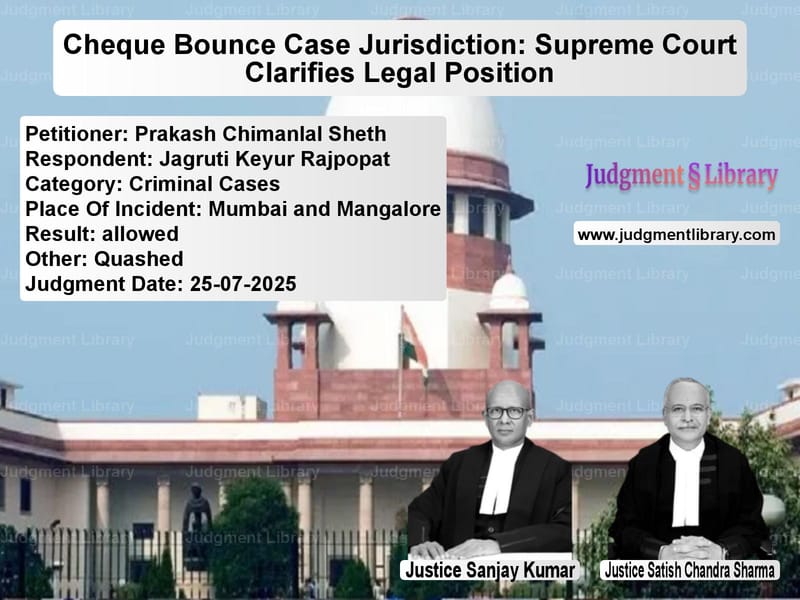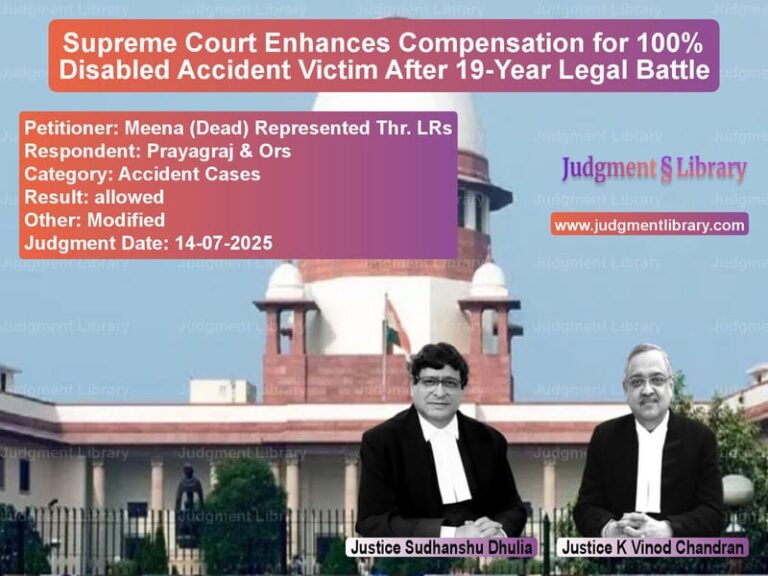Cheque Bounce Case Jurisdiction: Supreme Court Clarifies Legal Position
In a significant ruling that brings clarity to thousands of cheque bounce cases filed across India every year, the Supreme Court has delivered an important judgment on the crucial question of territorial jurisdiction in cases under the Negotiable Instruments Act. The case involved Prakash Chimanlal Sheth, who found himself caught in a legal maze when his complaints against Jagruti Keyur Rajpopat were returned by courts at multiple levels on grounds of lacking territorial jurisdiction, despite what he believed was a clear legal position.
The dispute originated from a financial transaction where Keyur Lalitbhai Rajpopat borrowed a sum of ₹38,50,000 from Prakash Sheth, with his wife Jagruti standing as guarantor for the repayment. She also availed additional financial assistance, leading to four cheques being issued by her in September 2023 to discharge both her husband’s liability and her own. When these cheques were deposited by Sheth at Kotak Mahindra Bank’s Opera House Branch in Mumbai, they were dishonored due to insufficient funds on September 15, 2023, setting the stage for a legal battle that would eventually reach the highest court of the land.
The Legal Journey Through Lower Courts
Prakash Sheth, following the proper legal procedure, filed four complaint cases under Section 200 of the Criminal Procedure Code read with Section 138 of the Negotiable Instruments Act before the Judicial Magistrate First Class, Fifth Court in Mangalore. However, in a decision that would begin a lengthy legal ordeal, the learned Magistrate returned all four complaint cases on December 12, 2023, for presentation before what he deemed to be the ‘jurisdictional Court’.
The Magistrate’s reasoning was straightforward but, as would later be established, fundamentally flawed. He concluded that since the drawee bank was Kotak Mahindra Bank at Mumbai, his court in Mangalore lacked territorial jurisdiction to entertain the complaint cases. This decision forced Sheth to approach the High Court of Karnataka at Bengaluru under Section 482 of the Criminal Procedure Code, filing multiple criminal petitions to challenge the Magistrate’s order.
Unfortunately for Sheth, the High Court confirmed the Magistrate’s order and dismissed his petitions on March 5, 2024. The High Court, like the Magistrate before it, operated under what the Supreme Court would later identify as a ‘wrong impression’ – the assumption that Sheth maintained his bank account at the Opera House Branch of Kotak Mahindra Bank in Mumbai. This factual misunderstanding led to a legal error that would require the Supreme Court’s intervention to correct.
The Supreme Court Appeal
Faced with rejections at both the Magistrate and High Court levels, Sheth approached the Supreme Court, where his case finally found the correct legal interpretation. The learned senior counsel for the appellant presented a clear and compelling argument that formed the foundation of the Supreme Court’s eventual decision.
The learned senior counsel for the appellant asserted that “the appellant maintains his bank account with the Kotak Mahindra Bank at its Bendurwell, Mangalore Branch, and that he had merely presented the cheques issued by the respondent at the Bank’s Branch at Opera House, Mumbai, to be credited to the said account.”
This crucial distinction – between where a cheque is physically presented and where the payee actually maintains their account – became the central point of the legal dispute. The counsel further contended that “the High Court proceeded on the erroneous assumption that the appellant maintained his bank account at the Opera House Branch of Kotak Mahindra Bank in Mumbai and on the strength of this wrong premise, the High Court confirmed the order of the learned Magistrate, returning the complaint cases on the ground of territorial jurisdiction.”
The respondent, in her counter-affidavit, provided details of her own account with Kotak Mahindra Bank and presented evidence showing that the appellant’s account number was 0412108431. However, in a display of legal fairness, the learned counsel for the respondent acknowledged that “the appellant earlier maintained his bank account with the Opera House Branch of the Kotak Mahindra Bank at Mumbai but, thereafter, he got it transferred to the Bendurwell, Mangalore Branch.”
This admission proved crucial in establishing the factual matrix before the Supreme Court. The Court noted that “as matters stand, it is not in dispute that the appellant maintains his bank account with the Bendurwell, Mangalore Branch, of the Kotak Mahindra Bank and merely deposited the respondent’s cheques at its Mumbai Branch for the purpose of crediting his account in Mangalore.”
The Legal Framework and Precedents
The Supreme Court’s analysis centered on the interpretation of Section 142(2)(a) of the Negotiable Instruments Act, which specifically addresses the question of territorial jurisdiction in cheque dishonor cases. This provision, as amended in 2015, was designed to bring clarity to exactly the kind of jurisdictional confusion that arose in this case.
The Court clearly stated that “Section 142(2)(a) of the N.I. Act makes it clear that an offence under Section 138 thereof should be inquired into and tried only by a Court within whose local jurisdiction, if the cheque is delivered for collection through an account, the branch of the bank where the payee maintains the account is situated.”
This interpretation was consistent with the Court’s earlier ruling in Bridgestone India Private Limited vs. Inderpal Singh, where the Court had affirmed that “Section 142(2)(a) of the N.I. Act vests jurisdiction apropos an offence under Section 138 thereof in the Court where the cheque is delivered for collection, that is, through an account in the Branch of the Bank where the payee maintains that account.”
The legislative intent behind this provision was to simplify the process for complainants in cheque bounce cases by allowing them to file cases where they maintain their accounts, rather than where the cheque was physically presented or where the drawer resides. This consumer-friendly approach recognizes the practical difficulties that payees might face in pursuing legal action in multiple jurisdictions.
The Supreme Court’s Landmark Ruling
Applying the clear language of the statute to the established facts of the case, the Supreme Court reached an unequivocal conclusion. The Court held that “once it is established that, at the time of presentation of the cheques in question, the appellant maintained his account with the Kotak Mahindra Bank at its Bendurwell, Mangalore Branch, he was fully justified in filing his complaint cases before the jurisdictional Court at Mangalore.”
The Court was categorical in its criticism of the lower courts’ approach, stating that “The understanding to the contrary of the learned Magistrate at Mangalore was erroneous and completely opposed to the clear mandate of Section 142(2)(a) of the N.I. Act.”
Similarly, the Court found that “The High Court proceeded to confirm the erroneous order passed by the learned Magistrate under the wrong impression that the appellant maintained his bank account at the Opera House Branch of the Kotak Mahindra Bank at Mumbai.”
This clear finding highlights the importance of establishing correct facts before applying legal principles – a fundamental aspect of judicial decision-making that had been overlooked in the earlier proceedings.
Practical Implications and Relief Granted
The Supreme Court’s decision has immediate practical implications for the thousands of cheque bounce cases filed across India. By clarifying that jurisdiction lies where the payee maintains their account, rather than where the cheque is physically presented, the Court has simplified the process for aggrieved parties seeking legal recourse.
In the specific case, the Court allowed the appeals and set aside both the High Court’s order dated March 5, 2024, and the Magistrate’s order dated December 12, 2023. The Court directed that “The learned Judicial Magistrate First Class, Fifth Court, Mangalore, shall entertain and expeditiously adjudicate the complaint cases filed by the appellant in accordance with law.”
This direction not only provides relief to the specific appellant but also serves as guidance to lower courts across the country on how to properly apply the jurisdictional provisions of the Negotiable Instruments Act.
Broader Legal Significance
This judgment represents more than just the resolution of an individual dispute; it reinforces the importance of statutory interpretation based on clear legislative language. The 2015 amendment to Section 142 of the Negotiable Instruments Act was specifically designed to eliminate jurisdictional ambiguities that had plagued cheque bounce cases for years.
By strictly applying the amended provision, the Supreme Court has ensured that the legislative intent behind the amendment is fully realized. The decision prevents defendants from using jurisdictional technicalities to delay or frustrate legitimate claims, thereby strengthening the efficacy of the Negotiable Instruments Act as a tool for ensuring commercial reliability.
For the common person dealing with cheque bounce issues, this judgment provides much-needed clarity and reduces the legal uncertainty that can make pursuing such cases daunting. It establishes that as long as the payee files the case in the jurisdiction where they maintain their bank account, they are following the correct legal procedure, regardless of where the cheque was physically presented or where the drawer resides.
The Supreme Court’s intervention in this case serves as an important reminder that technical legal provisions should be interpreted in a manner that facilitates access to justice rather than creating unnecessary procedural hurdles. By correcting the errors of the lower courts and providing clear guidance for future cases, the Court has strengthened the legal framework governing negotiable instruments and enhanced confidence in the country’s commercial dispute resolution mechanism.
Petitioner Name: Prakash Chimanlal Sheth.Respondent Name: Jagruti Keyur Rajpopat.Judgment By: Justice Sanjay Kumar, Justice Satish Chandra Sharma.Place Of Incident: Mumbai and Mangalore.Judgment Date: 25-07-2025.Result: allowed.
Don’t miss out on the full details! Download the complete judgment in PDF format below and gain valuable insights instantly!
Download Judgment: prakash-chimanlal-sh-vs-jagruti-keyur-rajpop-supreme-court-of-india-judgment-dated-25-07-2025.pdf
Directly Download Judgment: Directly download this Judgment
See all petitions in Cheque Dishonour Cases
See all petitions in Banking Regulations
See all petitions in Judgment by Sanjay Kumar
See all petitions in Judgment by Satish Chandra Sharma
See all petitions in allowed
See all petitions in Quashed
See all petitions in supreme court of India judgments July 2025
See all petitions in 2025 judgments
See all posts in Criminal Cases Category
See all allowed petitions in Criminal Cases Category
See all Dismissed petitions in Criminal Cases Category
See all partially allowed petitions in Criminal Cases Category







